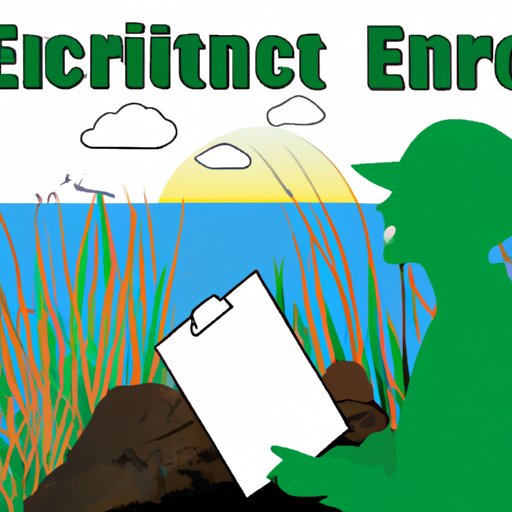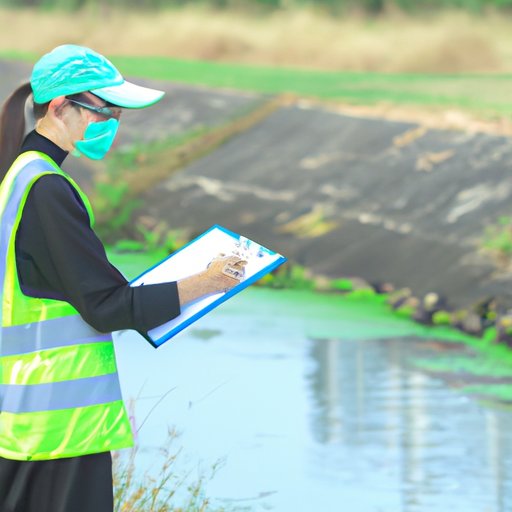Introduction
An environmental science degree is an interdisciplinary field of study that combines aspects of biology, chemistry, and other sciences to understand how humans interact with the environment. This type of degree can lead to a wide range of job opportunities in industries such as government, non-profits, businesses, research, and education. In this article, we will explore some of the potential career paths for those with an environmental science degree.

Exploring Career Opportunities in Environmental Science
When it comes to career opportunities in environmental science, there are many different types of jobs available. These include positions in research, policy analysis, natural resource management, environmental engineering, and sustainability. Depending on the type of job you choose, you may also need additional certifications or qualifications.
When deciding which job path to pursue, it’s important to consider your interests and skills. For example, if you’re interested in research, then a job in a laboratory or university setting might be a good fit. If you’re more interested in policy and advocacy, then a job in a government agency or non-profit organization could be a better choice.

Working in Government Agencies to Protect the Environment
For those with an environmental science degree, there are many ways to get involved in protecting the environment through government agencies. These include positions in environmental regulation, conservation, and environmental education. Working in these areas can provide a great opportunity for individuals to make a positive impact on their local communities and the world at large.
In addition to providing a chance to make a difference, working in government agencies also offers several benefits. These include job security, competitive salaries, and excellent benefits packages. Plus, many government agencies provide employees with the opportunity to work flexible hours and telecommute.
Starting a Green Business
If you’re looking to put your environmental science degree to use in the business world, then starting a green business could be a great option. There are many opportunities to identify and capitalize on the growing demand for eco-friendly products and services. Examples of green businesses include renewable energy companies, sustainable agriculture operations, and eco-tourism ventures.
When starting a green business, it’s important to do your research and develop a comprehensive business plan. Additionally, you should consider the legal and financial implications of running a business, as well as the environmental regulations that apply to your particular industry.
Becoming an Environmental Educator
Another way to use your environmental science degree is by becoming an environmental educator. These professionals work to educate the public about environmental issues, such as global warming, air and water pollution, and deforestation. To become an environmental educator, you will typically need a bachelor’s degree in environmental science or a related field.
Job opportunities for environmental educators can be found in schools, museums, parks, zoos, and other organizations. You may also be able to find freelance or contract work teaching classes or leading tours. Additionally, many environmental organizations offer internships or volunteer positions that can provide valuable experience and help you gain contacts in the field.

Pursuing Graduate Studies in Environmental Science
For those who want to continue their education in the field of environmental science, pursuing a graduate degree is a great option. Graduate programs in environmental science can provide students with an in-depth understanding of the latest developments in their field. Additionally, graduate studies can open up new job opportunities and provide a competitive edge in the job market.
When considering graduate studies, it’s important to research the different types of programs available. These include master’s degrees, doctoral degrees, and certificate programs. Additionally, many universities offer online programs, which can provide flexibility for those who are unable to attend traditional classes.
Advocating for Change and Raising Awareness About Environmental Issues
In addition to working in the field or pursuing higher education, those with an environmental science degree can also advocate for change and raise awareness about environmental issues. There are many ways to do this, including attending protests, writing letters to elected officials, and participating in social media campaigns. Additionally, you can volunteer with local organizations or start your own initiative.
Raising awareness about environmental issues is an important part of protecting the environment. By educating others, you can help create a movement of people who are committed to making positive changes and preserving our planet for future generations.
Conclusion
An environmental science degree can provide many opportunities for those looking for a career in the field. From working in government agencies to starting a green business, becoming an environmental educator, pursuing graduate studies, and advocating for change, there are many paths to consider. No matter what path you choose, having an environmental science degree can open up a world of possibilities.
When deciding on a career path, it’s important to consider your interests, skills, and long-term goals. Additionally, take advantage of any internships or volunteer opportunities that come your way as they can provide valuable experience and help you build your network. Finally, don’t forget to use your voice to advocate for change and raise awareness about environmental issues.
(Note: Is this article not meeting your expectations? Do you have knowledge or insights to share? Unlock new opportunities and expand your reach by joining our authors team. Click Registration to join us and share your expertise with our readers.)
